 | TODAY IN SCIENCE HISTORY NEWSLETTER - 16 MARCH |
| Feature for Today |
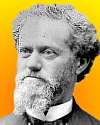 On 16 Mar 1836, Andrew S. Hallidie was born, who created the cable car system in San Francisco that is still much-loved by tourists. On 16 Mar 1836, Andrew S. Hallidie was born, who created the cable car system in San Francisco that is still much-loved by tourists.In its day, it solved the practical problem of transport up the steep roads of the city, on which even horses had difficulty. For insight into his life leading up to his invention of the cable car system read this short chapter from Heroes of California: The Story of The Founders of the Golden State (1910) on The Practical Hero Of Invention, Andrew Smith Hallidie. |
| Book of the Day | |
| |
| Quotations for Today | |
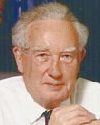 | "I do not believe that the present flowering of science is due in the least to a real appreciation of the beauty and intellectual discipline of the subject. It is due simply to the fact that power, wealth and prestige can only be obtained by the correct application of science." |
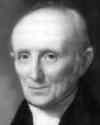 | "Whenever I meet in Laplace with the words 'Thus it plainly appears', I am sure that hours and perhaps days, of hard study will alone enable me to discover how it plainly appears." |
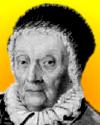 | "My dear nephew was only in his sixth year when I came to be detached from the family circle. But this did not hinder John and I from remaining the most affectionate friends, and many a half or whole holiday he was allowed to spend with me, was dedicated to making experiments in chemistry, where generally all boxes, tops of tea-canisters, pepper-boxes, teacups, &c., served for the necessary vessels, and the sand-tub furnished the matter to be analysed. I only had to take care to exclude water, which would have produced havoc on my carpet." |
| QUIZ | |
| Before you look at today's web page, see if you can answer some of these questions about the events that happened on this day. Some of the names are very familiar. Others will likely stump you. Tickle your curiosity with these questions, then check your answers on today's web page. | |
| Births | |
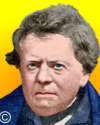 |  A German physicist, born 16 Mar 1789, showed by experiment (1825) that there are no "perfect" electrical conductors. All conductors have some resistance. He stated, "If the given temperature remains constant, the current flowing through certain conductors is proportional to the potential difference (voltage) across it." A German physicist, born 16 Mar 1789, showed by experiment (1825) that there are no "perfect" electrical conductors. All conductors have some resistance. He stated, "If the given temperature remains constant, the current flowing through certain conductors is proportional to the potential difference (voltage) across it." |
| Deaths | |
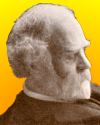 |  Sir John Murray (1841-1914) was a Scottish naturalist who studied ocean basins, deep-sea deposits, and coral-reef formation. As a marine scientist, he was first to observe the Mid-Atlantic Ridge and the existence of marine trenches. Sir John Murray (1841-1914) was a Scottish naturalist who studied ocean basins, deep-sea deposits, and coral-reef formation. As a marine scientist, he was first to observe the Mid-Atlantic Ridge and the existence of marine trenches.  What name did he coin for the marine science of which he was one of the founders? What name did he coin for the marine science of which he was one of the founders? |
| Events | |
 |  On 16 Mar of a certain year, the first US liquid-fuel rocket flight was launched by Robert Goddard in a field in Auburn, Mass. He thought stable flight could be obtained by mounting the rocket ahead of the fuel tank. The tank was shielded from the flame by a metal cone and was pulled behind the rocket by the lines for gasoline fuel and oxygen. It reached 41-ft, and travelled 184 feet away in 2.5 seconds. On 16 Mar of a certain year, the first US liquid-fuel rocket flight was launched by Robert Goddard in a field in Auburn, Mass. He thought stable flight could be obtained by mounting the rocket ahead of the fuel tank. The tank was shielded from the flame by a metal cone and was pulled behind the rocket by the lines for gasoline fuel and oxygen. It reached 41-ft, and travelled 184 feet away in 2.5 seconds.  In what decade was Goddard's first liquid-fuel rocket flight made? In what decade was Goddard's first liquid-fuel rocket flight made? |
 |  On 16 Mar 1867, a physician published an article in the Lancet on his discovery of antiseptic surgery, the first of a series of such articles that he wrote. On 16 Mar 1867, a physician published an article in the Lancet on his discovery of antiseptic surgery, the first of a series of such articles that he wrote.  Can you name this surgeon? Can you name this surgeon? |
 |  On 16 Mar 1819, the first clinical description of an allergy was delivered by Dr John Bostock to a meeting of the Royal Medical and Chirurgical Society in London. The pollens of grasses, weeds and trees are the main causes of this type of allergy. On 16 Mar 1819, the first clinical description of an allergy was delivered by Dr John Bostock to a meeting of the Royal Medical and Chirurgical Society in London. The pollens of grasses, weeds and trees are the main causes of this type of allergy.  What allergy was this? What allergy was this? |
| Answers |
When you have your answers ready to all the questions above, you'll find all the information to check them, and more, on the March 16 web page of Today in Science History. Or, try this link first for just the brief answers. Fast answers for the previous newsletter for March 15: bone marrow; cholera; Arthur Holly Compton; the London sewer system; the decade including the year 1892. |
| Feedback |
 If you enjoy this newsletter, the website, or wish to offer encouragement or ideas, please send feedback by using your mail reader Reply button. If you enjoy this newsletter, the website, or wish to offer encouragement or ideas, please send feedback by using your mail reader Reply button. |
--
If you do not want to receive any more newsletters, Unsubscribe
To update your preferences and to unsubscribe visit this link


Δεν υπάρχουν σχόλια:
Δημοσίευση σχολίου